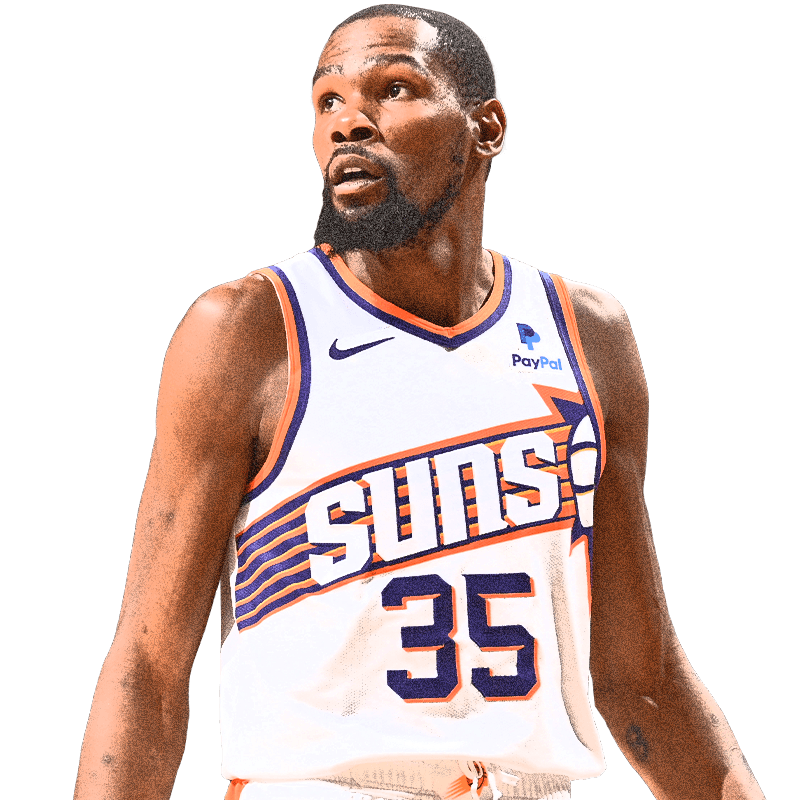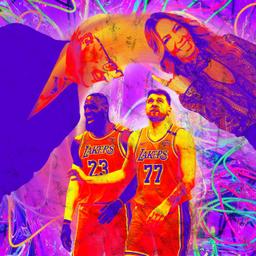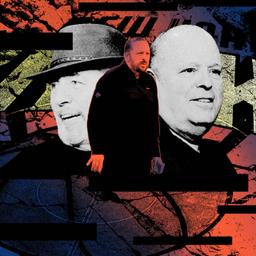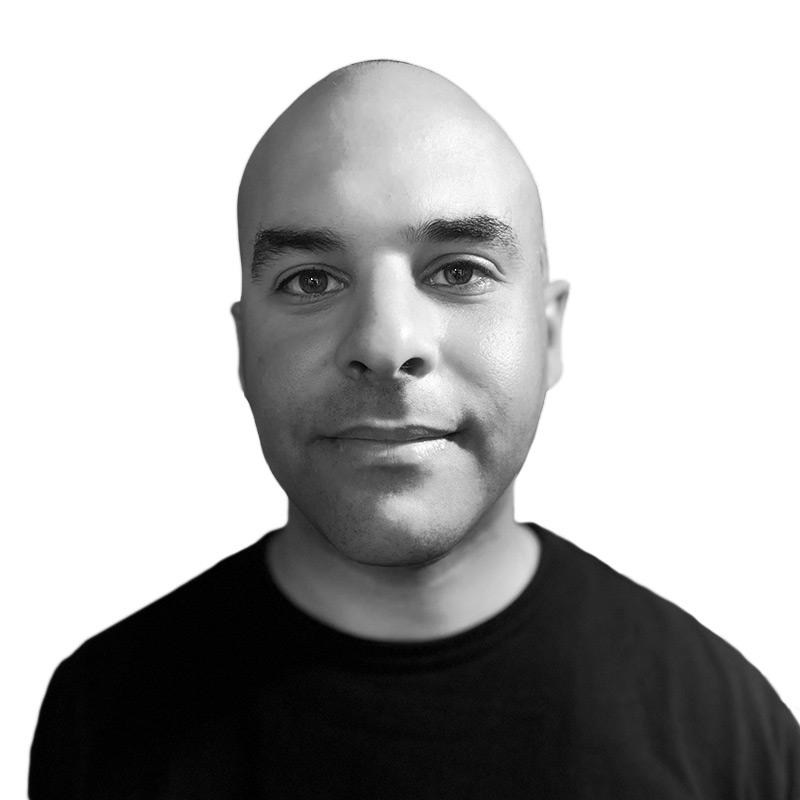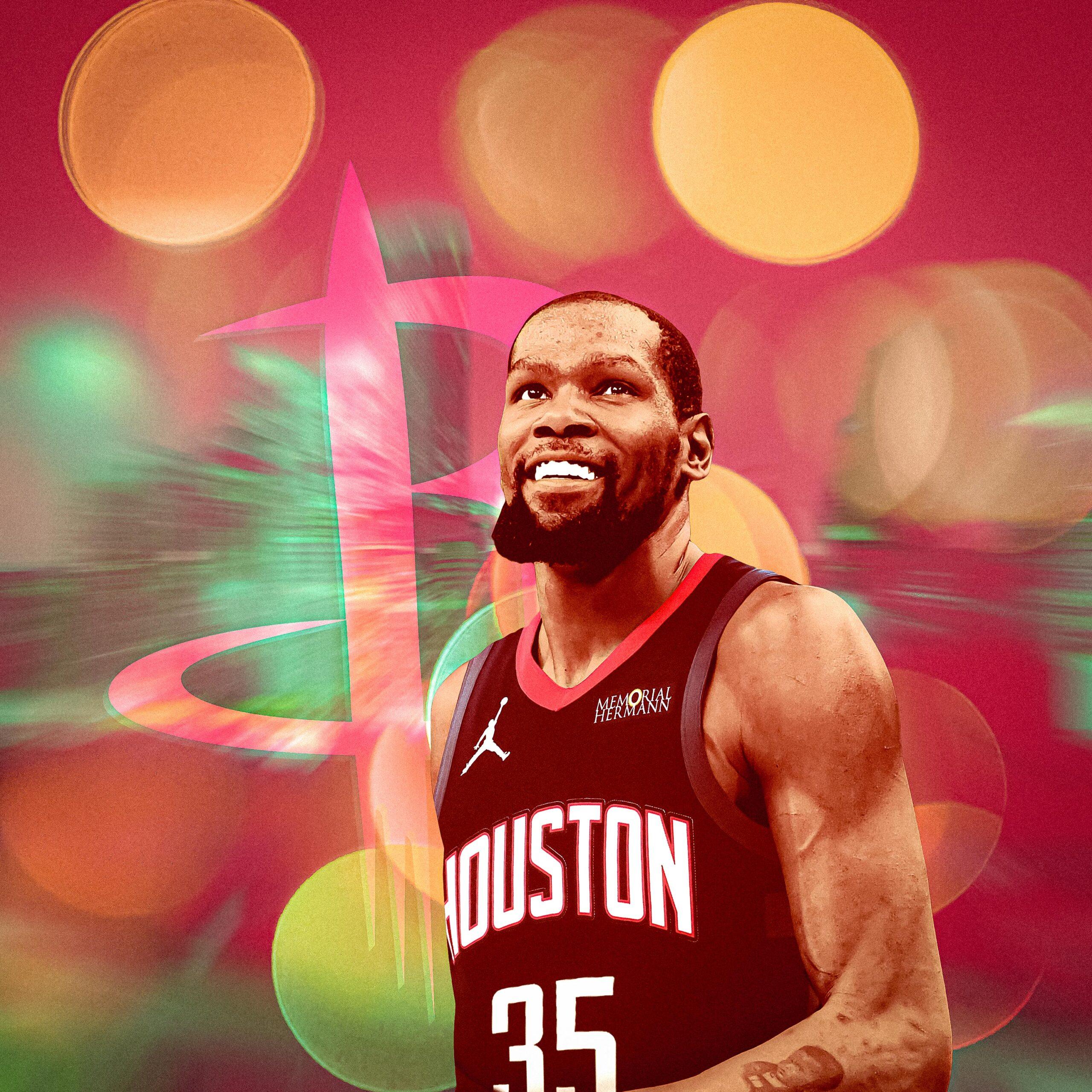
It finally happened (at the dumbest possible time)! The Phoenix Suns have traded Kevin Durant to the Houston Rockets for Jalen Green, Dillon Brooks, the 10th pick in this year’s draft, and five second-round picks. There’s so much to unpack here, but let’s start with the more relevant side of this transaction.
After losing a competitive first-round matchup against the Golden State Warriors, the Rockets were able to see what they need to take the next step. Durant, by himself, can be the ladder to contention they’re looking for. In a nutshell: Houston was an offensively impaired team that surrendered nothing of serious consequence for an all-time great scorer who quietly submitted the third-highest effective field goal percentage of his career last season.
There are obvious general risks that come with trading for a 36-year-old who’s now eligible for a two-year, $100-plus million extension, but the Rockets would be foolish to turn down a trade that elevates their short-term ceiling without hampering any progress they can still make down the line. For an aspiring contender that spent last season establishing a championship-level defensive identity, it’s kind of a bargain.
Durant is a towering, score-from-anywhere assassin who can open up Ime Udoka’s playbook without stunting anyone else’s individual growth. In a high-leverage spot after the opponent takes away options A, B, and C, we’re talking about an established star who can still make something very good happen for himself or someone else—a.k.a. exactly what the Rockets needed in the playoffs. Last season, languishing in the NBA’s saddest situation, Durant was still one of the league’s most efficient high-volume players in isolation. The real beauty of this addition, though, is that KD doesn’t need the ball in his hands to positively impact games; the attention he’ll draw in a half-court offense that ranked 22nd last season will make life so much easier for Alperen Sengun, Amen Thompson, Fred VanVleet, Jabari Smith Jr., Tari Eason, Reed Sheppard, and his former Oklahoma City Thunder teammate Steven Adams.
Houston’s identity doesn’t have to change on either side of the ball. It can still be one of the best teams in the league at crashing the offensive glass, getting back in transition, switching screens, limiting opposing 3s, and being extremely physical. Every lineup combination that was already pretty good last year will be enhanced with Durant in it.
The likely starting five of VanVleet, Thompson, Durant, Smith, and Sengun can be one of the league’s most potent units. When Udoka wants to punish opponents in the paint, he can roll out the Sengun-Adams tandem that crushed the league last season and have KD handle the ball without assuming any of the physical burden he had to endure on a Suns team that never fortified its frontcourt. The Rockets will likely still switch a ton of screens, but Durant will never have to guard a top-two (or top-three?) opposing scorer on the other team. The loss of Brooks’s tenacity will be felt, but Thompson is a Defensive Player of the Year candidate, backed by versatile options like Smith and Eason on the wing. On offense, the Rockets don’t have to play through Durant either, with VanVleet and Sengun likely still existing as the initiating hubs in a system that won’t screech to sudden halts like it did last season.
Everything about Durant being on the team is additive. Pure luxury down a two-way street: The 15-time All-Star is coming into a mutually beneficial situation where his defensive responsibilities will shrink and his offensive usage will be well-calibrated. There’s no need to wear down someone who will be playing in his 18th season; Houston, as a team that just finished with the second-best record in the Western Conference, is built to insulate him in myriad ways. The fit is flawless.
Of course, this trade also signals that the Rockets feel like they’re good enough to win it all right away. There’s no promise they actually will, but they also aren’t wrong for feeling that way. Beside someone with Durant’s gravity, Thompson, who is 22 years old, and Sengun, who will turn 23 next month, should develop even quicker. (It’s one of many reasons KD’s team just about always has an elite half-court offense that’s better with him on the court than off.) Skepticism about two integral building blocks who don’t have a 3-point shot is understandable, but as long as they’re surrounded by reliable outside threats—which Houston now has—the speed, power, and skill Thompson and Sengun bring to the table can overwhelm those weaknesses.
They are deep, young, experienced, self-aware, extremely well-coached, and elite in areas that win playoff games, and they can match up pretty well with any team—including Oklahoma City—in a seven-game series. We have no idea how the rest of the offseason will shake out, but right now, it’s fair to say the Rockets should expect to be in the conference finals at least. It’s also worth mentioning that this trade isn’t anything close to an all-in move, which opens the door for Houston to make more deals over the next few transaction cycles—whether that’s exchanging picks and young talent (two things they still have a ton of) for established, win-now, complementary pieces or elbowing their way to the front of the line in any bid to land a legitimate superstar.
Now [long, deep, super sad sigh], let’s talk about the Suns. Even though we knew the return for Durant would be light, it’s still remarkable to see how thin it was when you consider that Suns owner Mat Ishbia has essentially turned Mikal Bridges, Cam Johnson, Jae Crowder, and three unprotected first-round picks into Brooks, Green, and five second-rounders. Yikes.
There’s nothing they could’ve done to salvage the situation at this point, though. Instead of being proactive and realistic about how screwed up it really was a few months ago, Phoenix waited until the last moment and sabotaged all its leverage by letting Durant shrink the market. There was no real opportunity to canvass the league for better offers. It was either exactly what Houston wanted to give them or whatever the Miami Heat were willing to surrender. (In addition to those two, the San Antonio Spurs were the third team on Durant’s list of preferred destinations, but he always needed them way more than the Spurs needed him, effectively short-circuiting any constructive dialogue between the two teams.)
So, where does that leave the Suns? They just traded their best player for a return that puts them on a barely brighter path than they were on 24 hours ago. Sure, draft equity will help an organization that’s desperate for cost-controlled assets. But what reason does anyone have to believe Phoenix’s new front office (i.e., Mat Ishbia) can nail the 10th pick and add the type of blue-chip prospect who can make Devin Booker feel good about spending the rest of his prime as the face of a pitiful franchise?
Maybe the Suns will trade the pick for depth pieces who can better help the team win now? Who knows? In the meantime, the fact that they failed to extract any of their own future picks (in 2027 and 2029) from Houston is, while not unexpected, an embarrassing reminder of how futile Phoenix’s future still is. There’s a less-than-zero chance that, instead of Green, Brooks—an ostensible salary filler who will turn 30 next season—will become the crown jewel of Phoenix’s haul. I wouldn’t necessarily bet on that happening, but at the same time, I am also struggling to think of any players earning over $30 million in 2026 who make less sense on the Suns. Zach LaVine? Sure. Um, Deandre Ayton?
Green is a hyper-athletic 23-year-old who’s established himself as someone who can score a bunch of points and take a ton of shots. His defensive shortcomings, fictional development as a decision-maker, and role-related overlap with Booker (and Bradley Beal) make him redundant to the point where it should not surprise anyone if Green is rerouted before next year’s deadline. Alas, Green’s contract always made him the most likely member of Houston’s core to be dealt in a move like this. And the Rockets had no incentive to part ways with anyone still on a rookie-scale contract.
In the end, all criticism of the Suns is less about this deal (which, to be clear, isn’t good) and more about the rash steps they’ve taken over the past couple of years to get here. Right now, their light at the end of the tunnel will most likely arrive in 2028, when their cap sheet will clear up and they’ll (presumably) have some more trade assets to play with. But Booker will be 32 that fall and (presumably) beyond frustrated by then. He may want to spend the rest of his career in one jersey, but there’s an alternate universe where he was the elite Suns scorer who landed in a much greener pasture. It feels like only a matter of time before that alternate universe becomes this one.



